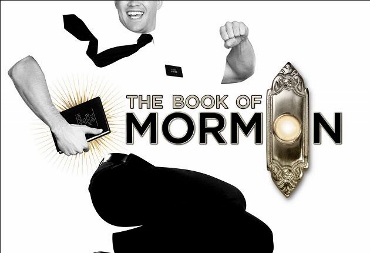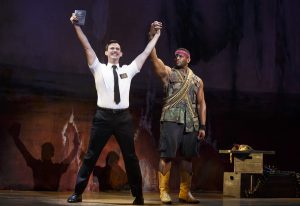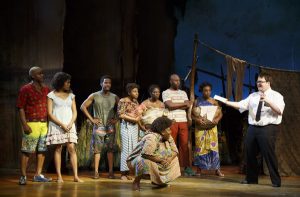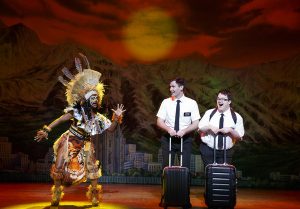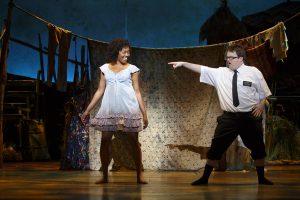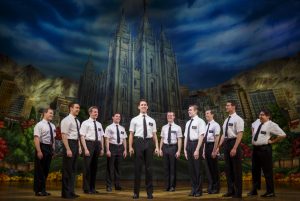FAITH IN FANTASY
One of the best and certainly funniest shows of this century has returned. Beginning its latest national tour at the Hollywood Pantages last night, The Book of Mormon remains a perfectly packaged fusion of the satire our world desperately needs and a sassy musical comedy. From the wizards who concocted the all-offending South Park comes an equally irreverent entertainment, which will be on the road well into 2018’”and for every good reason. Reveling in the contradiction between faith and fact, religious hope and real-life fear, this perfect parable is exuberantly profane, crudely compassionate, and equally witty in lyrics, dialogue, performance, dance, notes and theme.
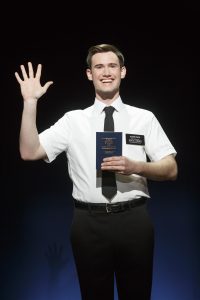 This wonderful collaboration by Trey Parker, Robert Lopez and Matt Stone exploits the inexhaustible vein of “fish out of water” humor: It contrasts young, eager-beaver Mormon missionaries on a two-year mini-crusade to proselytize and baptize with their less-than-converted African “beneficiaries.” It’s a marriage made in South Park hell.
This wonderful collaboration by Trey Parker, Robert Lopez and Matt Stone exploits the inexhaustible vein of “fish out of water” humor: It contrasts young, eager-beaver Mormon missionaries on a two-year mini-crusade to proselytize and baptize with their less-than-converted African “beneficiaries.” It’s a marriage made in South Park hell.
It’s also an exercise in opposites that never should attract. Here’s a marginalized, if not crackpot, denomination that believes that Jesus came to America to deliver the third part of the Bible. The angel Moroni directed the martyr Joseph Smith to the book, enshrined in gold plates which then mysteriously vanished. After Smith was murdered by a mob, his successful disciple Brigham Young, architect of polygamy and huge families, led the new Mormons into Utah. Now, these Latter Day Saints offer the unedifying message of a mythical American war between Hebrew tribes whom God punished by “reducing” them to blacks and Asians.
Since then, bright-eyed young missionaries travel the world sending the message of Mormonism. Their targets in The Book of Mormon are poverty-ridden Ugandans mired in war and AIDS. In a famine-ridden cesspool, where the general warlord named Butt Fucking Naked (Oge Agulué) kills with impunity and mutilates women with terrible circumcisions’”and where the village doctor (Johnny Brantley III) boldly proclaims “I have maggots in my scrotum”’”these well-scrubbed Utahans mean well and offer zilch. The Ugandans also have their own set of superstitions: One native believes that sleeping with virgins prevents AIDS but the only virgins around are babies’”which doesn’t discourage him in the least. Have you guessed yet this happy musical ain’t for kiddies?
The outsiders are themselves caricatures in contrast. Elder Price (Gabe Gibbs, direct from the Broadway company) is as narcissistic as idealistic (his song “Mostly Me” says it all), deluded with theological grandeur but sublimating a ton of silent doubt; his ideal destination for healing the heathen is Orlando, a land rooted in faith in fantasy. Price’s self-appointed best friend Elder Cunningham (a buoyant, limber, loveable Conner Peirson, blessed with timeless comic timing) is a slacker of a follower, a doofus who never read the “boring” Book of Mormon and just wants to be somewhere new. The Africa he expects is straight out of The Lion King, but instead of “Hakuna Matata” (“no worries”), the Ugandans’ slogan “Hasa Diga Eebowai” is roughly translated as, well, let’s just say: a jeer to the Holy Spirit.
Yet, in one of many wicked twists that keep this spoofery nicely nuanced and devilishly ambiguous, it’s Cunningham’s own ignorance that lets him break all 72 rules and improvise his own Salt Lake City gospel to offer hope to the locals and, not incidentally, endear him to the chief’s daughter Nabulungi (captivating newcomer Leanne Robinson); their duet “Baptize Me” is a tour-de-force of double entendres. Near show’s end, the villagers celebrate the arrival of the Mission President (Ron Bohmer), there to see why these missionaries have baptized so many souls, with their own version of “The Small Cabin of Uncle Thomas” ballet from The King and I: They eagerly act out Cunningham’s ad-libbed credo, much to the horror of his Mormon overseers who disavow these homegrown heretics. (Many such references from other musicals abound.)
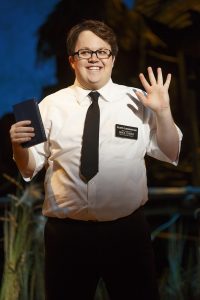 But it all ends amicably, with the Utah boys deciding to pursue and persist with their own kinder cult because, as Cunningham paraphrases Scarlett O’Hara, “Tomorrow is a Latter Day.”
But it all ends amicably, with the Utah boys deciding to pursue and persist with their own kinder cult because, as Cunningham paraphrases Scarlett O’Hara, “Tomorrow is a Latter Day.”
It’s one of many terrific songs: The night’s showstopper is “Turn It Off,” the missionaries’ answer to unpleasant memories and forbidden yearnings, including closeted homosexuality (with a terrific turn by PJ Adzima as the clearly gay Elder McKinley); “All-American Prophet,” the Mormon “creation myth”; “Man Up,” the exuberantly irrelevant first-act finale; “Spooky Mormon Hell Dream,” a hilariously detailed number in which Price, having given in to doubts and temporarily abandoned Cunningham, gets his just deserts; and the screamingly incongruous “I Am Africa,” in which the vanilla boys burst into their own tribal breakout dance, one of several delicious treats from choreographer Casey Nicholaw.
Everything clicks in this staging by Nicholaw and Parker’”Scott Pask’s delightfully detailed scenic drops, Ann Roth’s all-skewering costumes, Brian MacDevitt’s “bottled-lightning” lighting, and Brian Ronan’s sound design (sadly, the combination of national tour and the Pantages Theatre is a lethal combination for sound; way too many lyrics are lost). America should be proud that this kind of political incorrectness can be a hit.
photos by Joan Marcus (the first five are the 2016 national tour; the last group is this national tour)
The Book of Mormon
national tour
reviewed at Hollywood Pantages Theatre
for tickets, call call 800-982-2787 or visit Pantages
($25 tickets available at pre-show lottery)
**tour continues until October, 2018
for dates and cities, visit Book of Mormon
